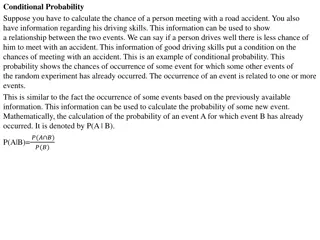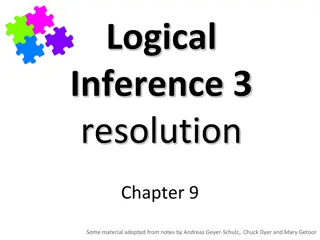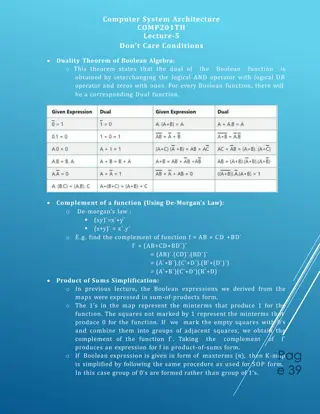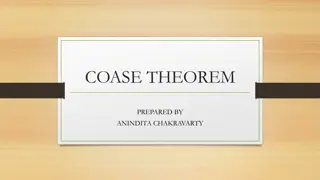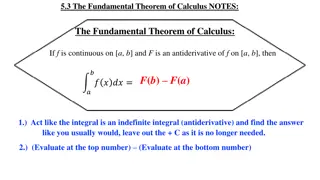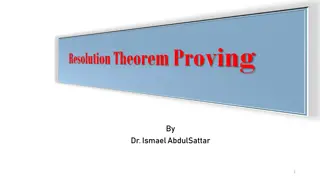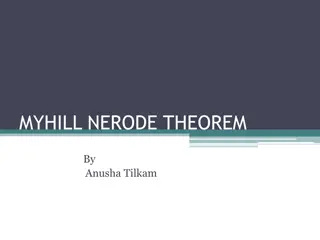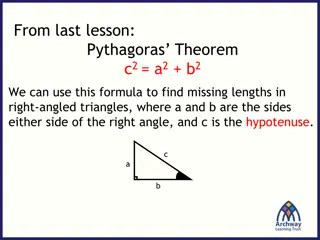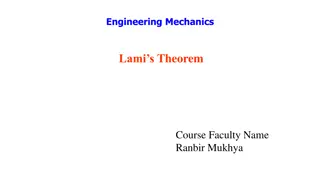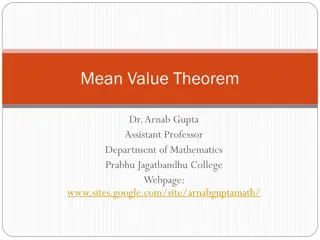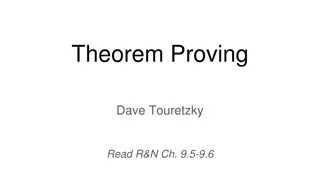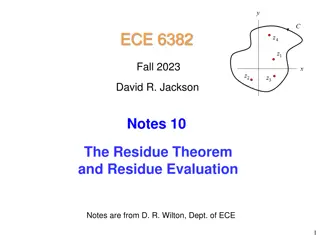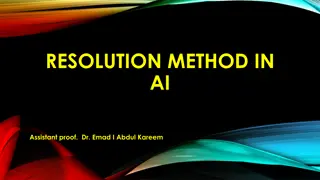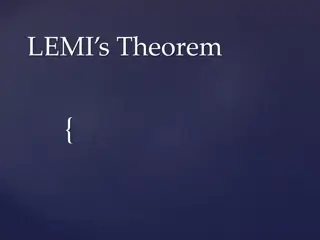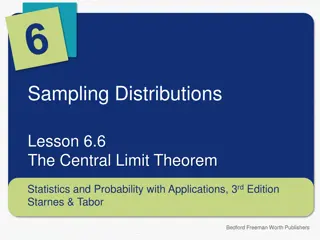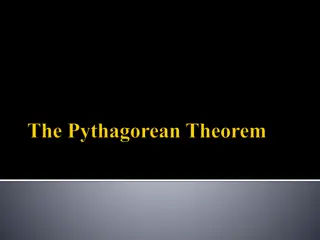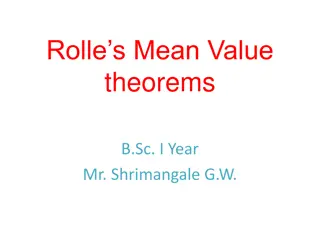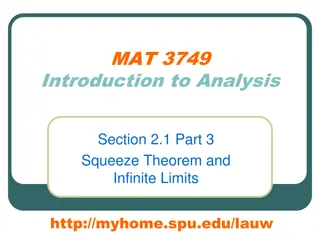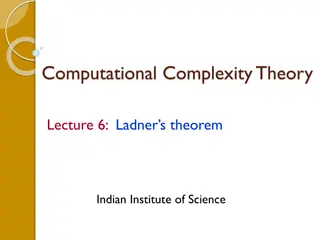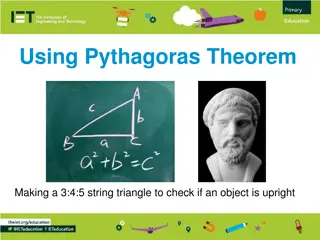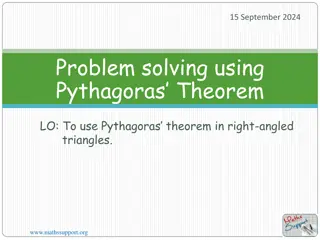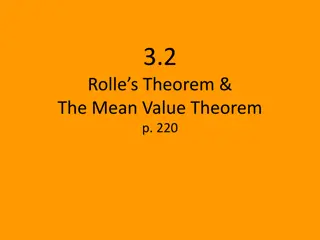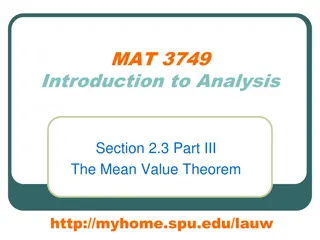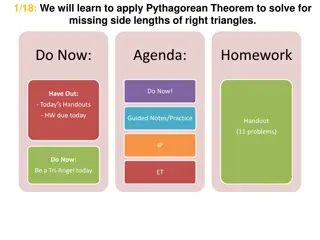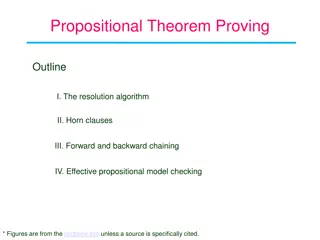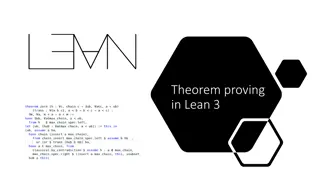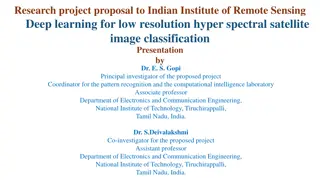Understanding Conditional Probability and Bayes Theorem
Conditional probability relates the likelihood of an event to the occurrence of another event. Theorems such as the Multiplication Theorem and Bayes Theorem provide a framework to calculate probabilities based on prior information. Conditional probability is used to analyze scenarios like the relati
1 views • 5 slides
Understanding Resolution in Logical Inference
Resolution is a crucial inference procedure in first-order logic, allowing for sound and complete reasoning in handling propositional logic, common normal forms for knowledge bases, resolution in first-order logic, proof trees, and refutation. Key concepts include deriving resolvents, detecting cont
1 views • 12 slides
Understanding Boolean Algebra: Duality Theorem, De-Morgan's Law, and Don't Care Conditions
Boolean algebra concepts such as the Duality Theorem, De-Morgan's Law, and Don't Care Conditions are essential for digital circuit design. The Duality Theorem states the relationship between a Boolean function and its dual function by interchanging AND with OR operators. De-Morgan's Law helps find t
0 views • 10 slides
Understanding the Coase Theorem: Property Rights and Economic Efficiency
The Coase Theorem, developed by economist Ronald Coase, posits that under certain conditions, bargaining related to property rights will lead to an optimal outcome regardless of the initial distribution. It provides a framework for resolving conflicts by emphasizing negotiation and efficient market
0 views • 10 slides
Understanding the Fundamental Theorem of Calculus
The Fundamental Theorem of Calculus states that if a function is continuous on an interval and has an antiderivative on that interval, then the integral of the function over the interval is equal to the difference of the antiderivative evaluated at the endpoints. This concept is further explored thr
0 views • 14 slides
Understanding Resolution Theorem Proving in Predicate Logic
Resolution theorem proving is a method used in predicate logic to find contradictions within a database of clauses. By negating statements and applying resolution rule of inference, it aims to show inconsistency to prove the original theorem. The process involves putting premises into clause form, a
0 views • 24 slides
Understanding Myhill-Nerode Theorem in Automata Theory
Myhill-Nerode theorem states that three statements are equivalent regarding the properties of a regular language: 1) L is the union of some equivalence classes of a right-invariant equivalence relation of finite index, 2) Equivalence relation RL is defined in a specific way, and 3) RL has finite ind
1 views • 20 slides
Challenges Faced by Insolvency Resolution Professionals during Corporate Insolvency Resolution Process
Insolvency Resolution Professionals encounter various challenges during the Corporate Insolvency Resolution Process, such as the need for prompt public announcements, appointing valuers, handling difficult transactions like preferential deals and related party transactions, assessing fraudulent acti
0 views • 8 slides
Understanding the Pythagorean Theorem and Right-Angled Triangles
Explore the Pythagorean Theorem, which states that in a right-angled triangle, the square of the length of the hypotenuse (c) is equal to the sum of the squares of the other two sides (a and b). Learn how to identify the hypotenuse, use the theorem to find missing lengths, and visually understand th
0 views • 25 slides
Engineering Mechanics: Lami's Theorem and Cylinder Reactions Problem
This course material covers Lami's Theorem in Engineering Mechanics taught by Ranbir Mukhya. It includes an outline of the theorem, problem scenarios involving cylinders with given weights and diameters, and the determination of reactions at various points. Detailed force diagrams and calculations a
0 views • 8 slides
Insights into the Mean Value Theorem and Its Applications
Delve into the Mean Value Theorem (MVT) with a focus on concepts like Lagrange's MVT, Rolle's Theorem, and the physical and geometrical interpretations. Explore the conditions, statements, and special cases of MVT, along with practical applications and geometric insights. Dr. Arnab Gupta, an Assista
0 views • 14 slides
Understanding Resolution in Theorem Proving
Exploring the process of resolution in theorem proving, starting from propositional resolution to the complexities of First-Order Logic. The conversion of FOL sentences to CNF, elimination of implications, variable standardization, Skolemization, and dropping universal quantifiers are all dissected
0 views • 34 slides
Understanding Exterior Angles in Polygons
This content explains the concept of exterior angles in polygons and the Exterior Angle Theorem. It covers how exterior angles are formed when the sides of a polygon are extended, their relationship with interior angles, and how to calculate their measures using the Exterior Angle Theorem. Various e
2 views • 26 slides
Understanding the Residue Theorem in Complex Analysis
The Residue Theorem is a powerful tool in complex analysis that allows us to evaluate line integrals around paths enclosing isolated singularities. By expanding the function in a Laurent series, deforming the contour, and summing residues, we can evaluate these integrals efficiently. This theorem ex
0 views • 31 slides
Effectiveness of Conflict Resolution Education in Schools
Conflict resolution education plays a crucial role in transforming school environments by reducing violence and promoting win-win outcomes. Various successful programs have shown significant improvements in school settings, such as reduced suspensions and conflicts among students. Conflict resolutio
7 views • 6 slides
Understanding Superposition Theorem in Electrical Circuits
Superposition theorem in electrical circuits states that the effects of multiple voltage and current sources in a network can be analyzed independently and then combined algebraically. This allows for calculating the voltage and current distribution in a network more efficiently. The theorem involve
0 views • 9 slides
RESOLUTION METHOD IN AI
Resolution method in AI is an inference rule used in propositional and first-order predicate logic to prove sentence satisfiability. It employs a proof by refutation technique to achieve contradiction, ultimately concluding the original goal's truth. The process involves converting statements to cla
0 views • 12 slides
Recent Developments on Super-Resolution: A Comprehensive Overview
Super-resolution technology aims to reconstruct high-resolution images from low-resolution inputs, with applications in video surveillance, medical diagnosis, and remote sensing. Various convolutional neural network (CNN) models have been developed, such as SRCNN, VDSR, ESPCN, and FSRCNN, each with
0 views • 12 slides
Understanding Lami's Theorem in Physics
Lami's Theorem is an equation that explains how the magnitudes of forces acting on a point keep an object in equilibrium. This theorem relates the forces with corresponding angles and is derived by understanding the sum of forces acting on a point. By utilizing complementary angles and the sine rule
0 views • 8 slides
Understanding the Central Limit Theorem in Statistics
This lesson covers the Central Limit Theorem, which states that the sampling distribution of a sample mean becomes approximately normal as the sample size increases, regardless of the population distribution. It explains how the distribution of sample means changes shape and approaches a normal dist
0 views • 7 slides
Exploring the Pythagorean Theorem and Its Origins
The Pythagorean Theorem, named after the ancient Greek mathematician Pythagoras, is a fundamental principle in geometry relating to right triangles. While Pythagoras is credited with offering a proof of the theorem, evidence suggests that earlier civilizations like the Babylonians and ancient Chines
0 views • 21 slides
Understanding the Pythagorean Theorem: History, Application, and Baseball Problem
Pythagoras, a renowned mathematician from ancient times, formulated the Pythagorean Theorem to calculate the lengths of sides in right triangles. This theorem has significant implications in various fields, aiding in distance computation, navigation, and ramp design. Moreover, its practical applicat
0 views • 14 slides
Understanding Rolle's Mean Value Theorem in Calculus
Rolle's Mean Value Theorem states that if a function is continuous in a closed interval, differentiable in the open interval, and the function values at the endpoints of the interval are equal, then there exists at least one point where the derivative of the function is zero. This theorem is verifie
0 views • 11 slides
Understanding the Squeeze Theorem in Analysis
Explore the Squeeze Theorem and its applications in infinite limits, one-sided limits, and limits at infinities. Discover the core concepts and examples to grasp the importance of this theorem in analysis and calculus.
0 views • 29 slides
Understanding Bayes Theorem in NLP: Examples and Applications
Introduction to Bayes Theorem in Natural Language Processing (NLP) with detailed examples and applications. Explains how Bayes Theorem is used to calculate probabilities in diagnostic tests and to analyze various scenarios such as disease prediction and feature identification. Covers the concept of
0 views • 13 slides
Ladner's Theorem in Computational Complexity Theory
Ladner's Theorem is a significant result in computational complexity theory that deals with NP-intermediate problems, which are languages in NP neither in P nor NP-complete. The theorem states that if P is not equal to NP, then there must exist an NP-intermediate language. The proof involves a delic
0 views • 48 slides
Exploring Pythagoras Theorem: Making a 3:4:5 String Triangle
Explore Pythagoras theorem by creating a 3:4:5 string triangle to test object alignment. Learn about Pythagoras, his theorem, and how it applies to right-angled triangles. Follow step-by-step instructions with images for a safe hands-on activity. Discover the significance of the 3:4:5 triangle and i
0 views • 15 slides
Problem Solving with Pythagoras Theorem in Geometry
Explore the application of Pythagoras Theorem in solving problems related to right-angled triangles, diagonals of shapes like rectangles and rhombuses, and the height of triangles. Learn how to use Pythagoras Theorem effectively by drawing diagrams, identifying known lengths, and using the theorem t
0 views • 8 slides
NOAA SAR High-Resolution Coastal Winds Overview
NOAA's Operational SAR Sea Surface Wind Products provide detailed information on wind patterns derived from SAR images. The system aims to implement high-resolution wind production, capable of deriving winds from various SAR satellites. The operational goals include compatibility with international
0 views • 28 slides
Understanding Calculus: From MVT to FTC with Lin McMullin
Join Lin McMullin in exploring the transition from the Mean Value Theorem (MVT) to the Fundamental Theorem of Calculus (FTC). Discover the significance of MVT, Fermat's Theorem, Rolle's Theorem, and the Mean Value Theorem, all crucial concepts in calculus. Engage in graphical explorations, proving m
0 views • 45 slides
Understanding Rolle's Theorem and The Mean Value Theorem in Calculus
Rolle's Theorem states that for a continuous and differentiable function on a closed interval with equal function values at the endpoints, there exists at least one point where the derivative is zero. The Mean Value Theorem asserts that for a continuous and differentiable function on an interval, th
0 views • 5 slides
Introduction to Analysis: Mean Value Theorem and Related Theorems
This resource delves into key concepts such as the Mean Value Theorem, Fermat's Theorem, Rolle's Theorem, Extreme Value Theorem, local maximums, and more. It presents important results and explores proofs in the context of analysis.
0 views • 71 slides
Introduction to Applying Pythagorean Theorem in Right Triangles
In this lesson, we will learn how to apply the Pythagorean Theorem to find missing side lengths of right triangles. The Pythagorean Theorem states that in a right triangle, the square of the hypotenuse is equal to the sum of the squares of the other two sides. Through examples and practice problems,
0 views • 13 slides
Propositional Theorem Proving Methods Overview
The overview covers essential techniques in propositional theorem proving including the resolution algorithm, Horn clauses, forward and backward chaining, and effective propositional model checking. It discusses methods such as resolution closure, completeness of resolution, and the significance of
0 views • 19 slides
Amendment Invoice Update Summary and Resolution Plan
Unique MPRNs with ASP mismatch issues were addressed, avoiding customer updates this month. An improved extraction process led to early file delivery and resolution steps cataloging was completed. Automation of exception resolution is in progress. Defect resolution was impacted by prioritization and
0 views • 10 slides
Understanding Binomial Theorem: Expansion, Examples, and Applications
Binomial theorem is a powerful mathematical concept used to expand expressions involving binomials. This presentation explores the basics of binomial expansion, formulae for positive, negative, and fractional indices, along with examples demonstrating its application. By leveraging the binomial theo
0 views • 10 slides
Understanding Spatial Resolution in Astronomical Imaging
This lecture delves into the requirements for resolution and sensitivity in astronomical imaging, exploring factors such as spatial resolution, optical design aberrations, and noise sources. It explains how spatial resolution is crucial in distinguishing objects, discussing the Rayleigh criterion an
0 views • 45 slides
Understanding Automated Theorem Proving in Lean
Dive into the world of automated theorem proving in Lean with a focus on formal verification, history, and the use of logic and computational methods. Explore how programs can assist in finding and verifying proofs, as well as the significance of interactive theorem provers. Discover the evolution o
0 views • 35 slides
Deep Learning for Low-Resolution Hyperspectral Satellite Image Classification
Dr. E. S. Gopi and Dr. S. Deivalakshmi propose a project at the Indian Institute of Remote Sensing to use Generative Adversarial Networks (GAN) for converting low-resolution hyperspectral images into high-resolution ones and developing a classifier for pixel-wise classification. The aim is to achiev
0 views • 25 slides
Understanding LRU Competitiveness Theorem
The Lemma states that if a page is ejected by the LRU algorithm after being touched in a request sequence, there is a fault in the offline algorithm. The Theorem extends this to show that for any segment where LRU incurs k faults, the offline algorithm also has a fault. The proof involves examining
0 views • 8 slides
